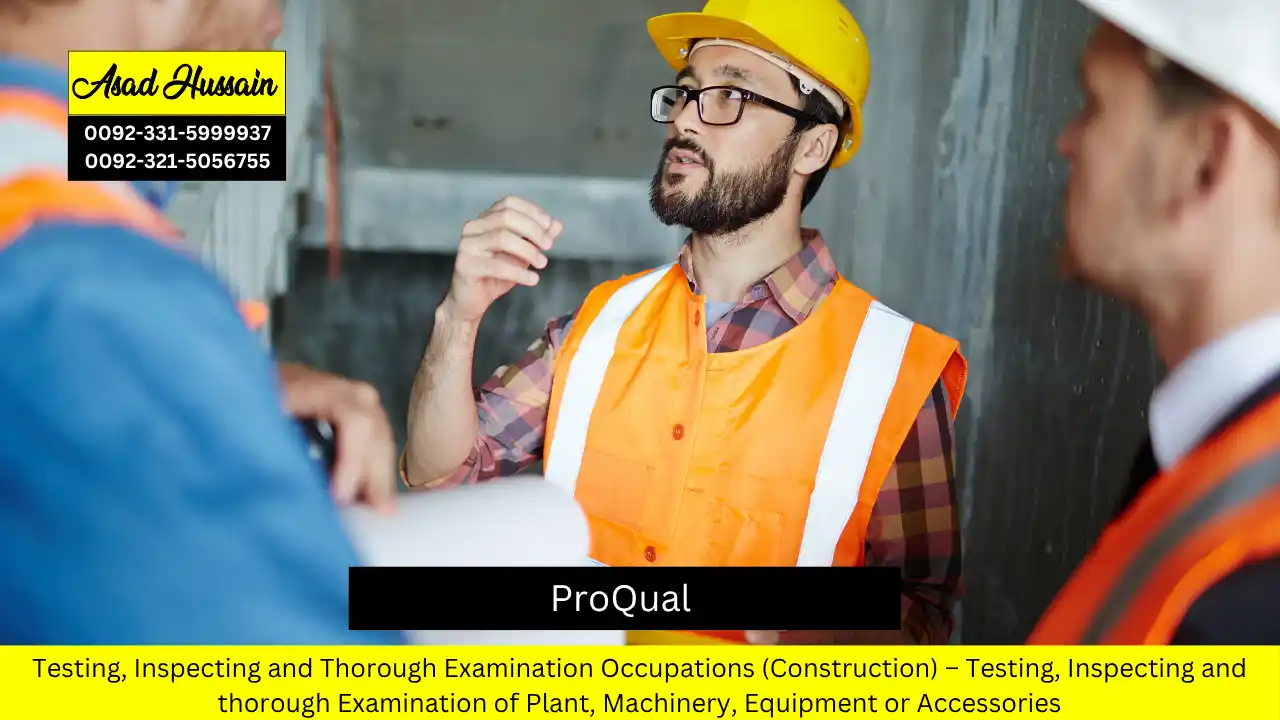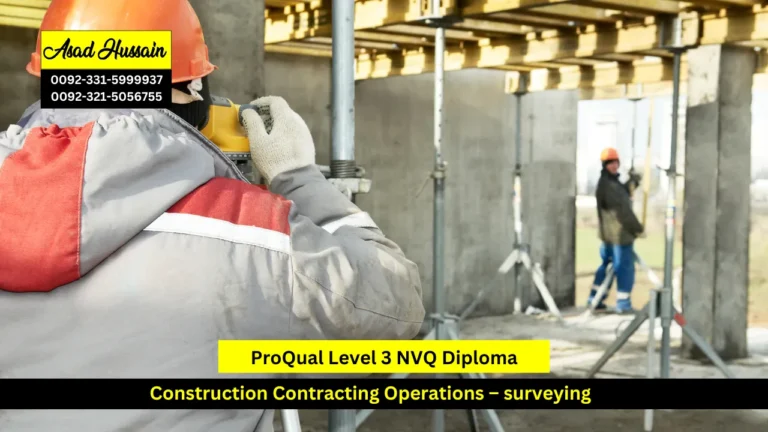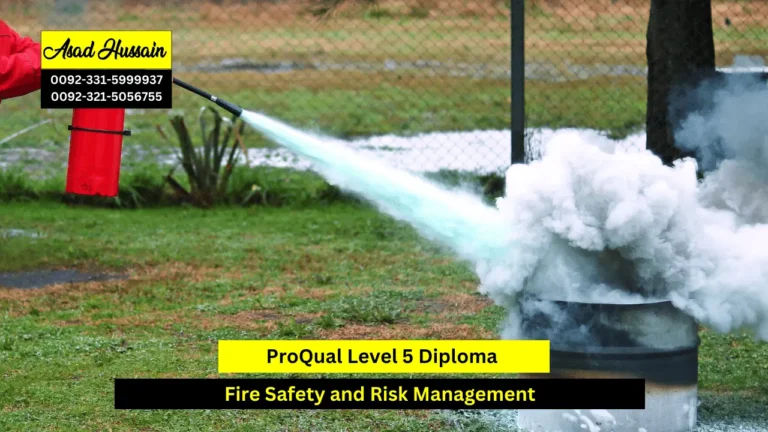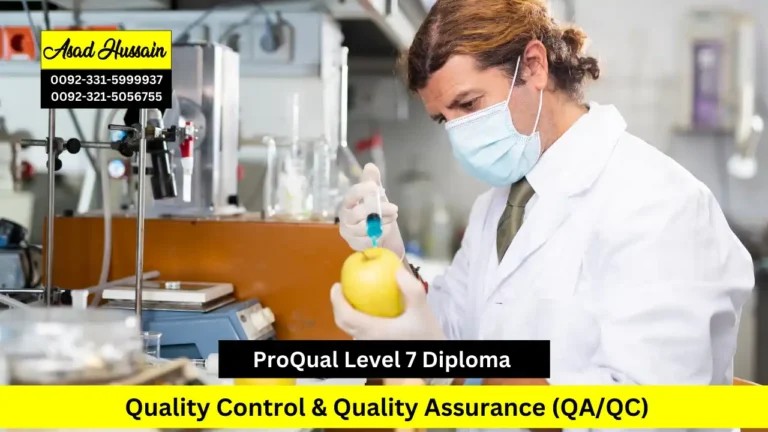The ProQual Level 3 NVQ Diploma in Testing, Inspecting and Thorough Examination Occupations (Construction) – Testing, Inspecting and thorough Examination of Plant, Machinery, Equipment or Accessories is a specialist vocational qualification for professionals responsible for ensuring the safety and compliance of critical equipment on construction sites. This diploma validates the advanced practical competence required to perform thorough examinations and inspections in accordance with statutory regulations, including LOLER and PUWER. It is a ProQual-accredited industry standard that formally recognises a practitioner’s ability to uphold the highest safety protocols, though it is not regulated by Ofqual.
Learners will demonstrate their expertise through the compilation of a detailed portfolio of workplace evidence, covering areas such as risk assessment, fault diagnosis, certification procedures, and the detailed reporting of inspection outcomes. The qualification assesses the ability to apply complex technical knowledge to real-world scenarios, ensuring plant and machinery are safe for operational use. This rigorous, competence-based approach guarantees that those who achieve this award are not only knowledgeable but also proficient in executing their vital safety-critical duties with precision and authority.
The ProQual Level 3 NVQ Diploma in Testing, Inspecting and Thorough Examination Occupations (Construction) – Testing, Inspecting and thorough Examination of Plant, Machinery, Equipment or Accessories serves as a definitive professional credential. Achievement of this diploma provides robust, industry-recognised proof of a technician’s or engineer’s competency, enhancing their professional credibility and employability. It is an essential certification for individuals committed to maintaining the highest standards of equipment safety and compliance within the construction and allied industries.
Program Highlights
Mandatory Units
The ProQual Level 3 NVQ Diploma in Testing, Inspecting and Thorough Examination Occupations (Construction) – Testing, Inspecting and thorough Examination of Plant, Machinery, Equipment or Accessories, To achieve the qualification candidates must complete ALL of the Mandatory units.
- Confirming work activities and resources for an occupational area in the workplace
- Developing and maintaining good occupational working relationships in the workplace
- Confirming the occupational method of work in the workplace
- Inspecting plant or machinery for operational serviceability in the workplace
- Carrying out specific tests on plant or machinery to determine operational serviceability in the workplace
Entry Requirements
Prospective candidates for this advanced technical diploma must meet the following entry criteria to ensure they are suitably positioned to generate the required evidence:
- Age and Status: Applicants must be a minimum of 18 years of age and must be employed in a role that involves the testing, inspection, and thorough examination of construction plant, machinery, equipment, or accessories. Access to a relevant workplace is mandatory for assessment.
- Educational Background: While no specific academic qualifications are mandated, holding related prior certifications such as a Level 2 NVQ in a mechanical, engineering, or plant maintenance discipline, or relevant manufacturer-specific training certificates, is highly advantageous and demonstrates foundational knowledge.
- Language Proficiency: Candidates must possess a strong command of English to accurately comprehend technical manuals, legislation, and engineering drawings, and to produce the detailed, precise written reports and certification required for the role and the qualification portfolio.
All applicants must have substantial practical experience and a deep understanding of the relevant regulations (e.g., LOLER, PUWER) in a construction or industrial environment. Assessors will verify that your job role provides the necessary scope to perform and evidence the full range of testing and inspection activities covered by the diploma
Learning Outcomes
1. Confirming Work Activities and Resources for an Occupational Area in the Workplace
- Identify work requirements and allocate appropriate resources for the task
- Interpret project information to confirm work instructions
- Assess potential issues affecting productivity or safety
- Communicate effectively with team members and supervisors to plan and organise work activities
- Ensure resources are available and suitable for the scope of work
2. Developing and Maintaining Good Occupational Working Relationships in the Workplace
- Establish effective communication with colleagues and other stakeholders
- Demonstrate respect, cooperation, and support in a team environment
- Resolve conflicts or misunderstandings in a professional manner
- Promote a positive and productive work culture
- Apply workplace protocols to maintain trust and efficiency
3. Confirming the Occupational Method of Work in the Workplace
- Confirm the correct methods, tools, and techniques for carrying out work tasks
- Ensure selected methods comply with project specifications, health and safety standards, and best practices
- Adapt work methods when necessary due to changes in conditions or resources
- Communicate chosen methods clearly to team members
- Monitor work activities to ensure methods are followed accurately
4. Inspecting Plant or Machinery for Operational Serviceability in the Workplace
- Conduct visual and functional inspections of plant or machinery to assess condition
- Identify faults, wear, damage, or signs of unsafe operation
- Apply inspection procedures in line with manufacturer guidelines and legislation
- Record findings accurately and report defects
- Take appropriate action to ensure non-serviceable equipment is isolated or removed from use
5. Carrying Out Specific Tests on Plant or Machinery to Determine Operational Serviceability in the Workplace
- Select and perform appropriate tests to assess the performance and functionality of machinery
- Use testing tools and instruments correctly and safely
- Interpret test results to determine compliance with operational standards
- Identify any performance issues and recommend corrective actions
- Complete test documentation and communicate findings effectively
These learning outcomes of this ProQual Level 3 NVQ Diploma in Testing, Inspecting and Thorough Examination Occupations (Construction) – Testing, Inspecting and thorough Examination of Plant, Machinery, Equipment or Accessories reflect the practical, competency-based nature of the NVQ and are designed to ensure learners can perform to a high standard in real workplace settings.
Target Audience
The ProQual Level 3 NVQ Diploma in Testing, Inspecting and Thorough Examination Occupations (Construction) is designed for experienced technicians and engineers who hold a critical, safety-assuring role within the construction and allied industries. This advanced vocational qualification is aimed at professionals responsible for ensuring that plant and machinery meet stringent legal and safety standards before use. It is specifically tailored for:
- Competent Persons and Thorough Examination Engineers designated under regulations such as LOLER (Lifting Operations and Lifting Equipment Regulations) to certify equipment.
- Plant Inspection Technicians and Mechanical Safety Engineers who conduct periodic and pre-use inspections of cranes, hoists, excavators, and other powered access equipment.
- Site-based Maintenance and Workshop Supervisors with responsibility for the compliance and safety certification of a fleet of machinery.
- Equipment Managers and Surveyors who need to formally validate their expertise in testing and inspection protocols for contractual or assurance purposes.
- Individuals seeking formal recognition of their specialized skills to enhance professional authority, meet client requirements, or fulfill specific senior technical role criteria.
Ultimately, the ProQual Level 3 NVQ Diploma in Testing, Inspecting and Thorough Examination Occupations (Construction) – Testing, Inspecting and thorough Examination of Plant, Machinery, Equipment or Accessories is the definitive credential for safety-critical professionals dedicated to upholding the highest standards of equipment integrity, ensuring site safety, and demonstrating certified, expert-level competency in this vital field.







